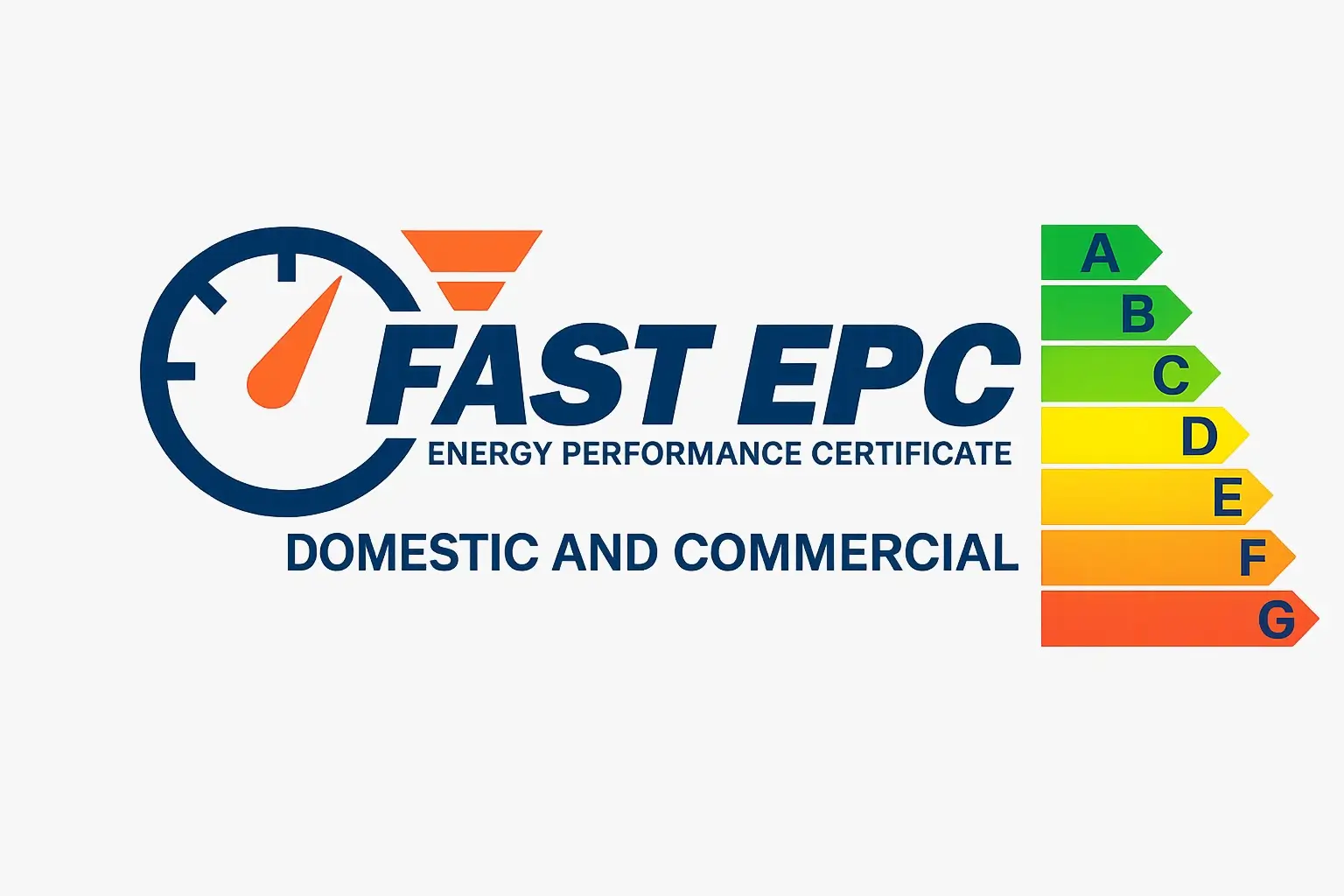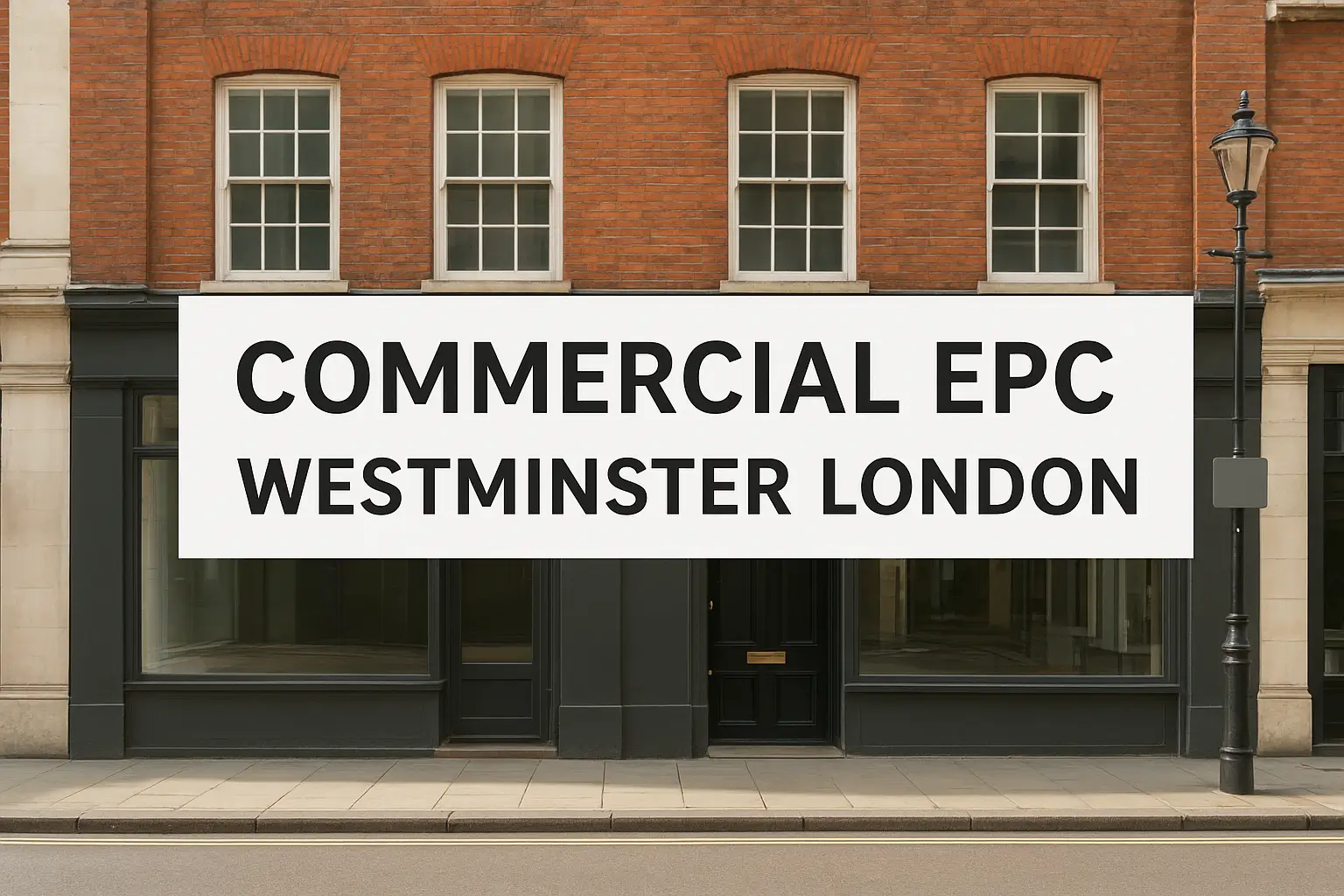Short answer: If you sell or rent a commercial building in Westminster, you must have a valid commercial EPC Westminster London. This guide explains everything in plain English. Read on. Then Book now to get a fast quote.
What this page is for
This page helps owners, landlords, agents and property managers in Westminster.
It explains:
-
What a commercial EPC Westminster London is.
-
When you must get one.
-
How much it costs.
-
How the survey works.
-
How to improve your rating.
-
Westminster-specific rules.
-
How to pick an assessor.
-
A clear call to action to Book now.
We use plain, short sentences. No jargon. If you want a certificate fast, scroll to the bottom and Book now.
What is a commercial EPC Westminster London?
A commercial EPC Westminster London is a certificate.
It shows how energy efficient a non-residential building is.
Examples: shops, offices, restaurants, warehouses, hotels.
The certificate gives a rating from A to G.
A is best. G is worst.
The report shows how much energy the building uses.
It lists ways to save energy.
It gives likely costs and savings for each suggestion.
The certificate is registered online.
It is usually valid for 10 years.
If you sell or rent a commercial building, you must show the certificate.
Who needs a commercial EPC Westminster London?
You need a commercial EPC Westminster London if you:
-
Sell a commercial property in Westminster.
-
Rent out (let) a business property in Westminster.
-
Make big changes that affect energy use.
-
Apply for certain planning or grant applications.
Some buildings can be exempt.
Examples of possible exemptions: some places of worship, temporary buildings, or very small detached buildings.
If you think your building is exempt, get written proof.
How long does a commercial EPC last?
A commercial EPC Westminster London usually lasts 10 years.
If you change the building (major works), you should get a new one.
If you sell or re-let after 10 years, you need a new certificate.
How much does a commercial EPC Westminster London cost?
Prices vary by size and complexity.
Below are typical ranges. These are rough guides.
-
Small shop or small office (up to 50 m²): from £159–£250.
-
Medium unit (50–300 m²): £250–£500.
-
Large or complex building (300 m²+ or multiple zones): £500+.
Costs depend on:
-
Size (m²).
-
Number of rooms and floors.
-
Number of heating/ventilation zones.
-
Need for SBEM or more complex modelling.
-
How fast you need the certificate.
Always ask for a written quote.
Ask what the quote includes.
Ask about travel or urgent fees.
Step by step: how a commercial EPC Westminster London is done
-
Ask for a quote.
Give the address, type of building and rough floor area.
You can also send plans if you have them. -
Agree a price and date.
The assessor will confirm a visit time. -
Site visit.
The assessor measures rooms.
They check heating, hot water, ventilation, lighting, insulation, glazing and controls.
They take photos. They ask questions. -
Modelling and report.
The assessor uses software to model the building.
They create the EPC and a list of recommendations. -
Certificate registered.
The EPC is lodged on the national register.
You get the final certificate and a short report. -
Optional: Improvement plan.
Some assessors offer a costed plan.
This shows likely savings and payback times.
Turnaround: standard buildings often get a certificate within a few days. Complex places take longer.
How long is the site visit?
-
Small units: 30–60 minutes.
-
Medium offices/shops: 1–2 hours.
-
Large or multi-zone buildings: several hours or more.
The assessor needs access to plant rooms and roof spaces if needed.
Make access easy to speed the visit.
How to choose an assessor for commercial EPC Westminster London
Choose an assessor who is:
-
Accredited. They must be registered with a recognised scheme.
-
Experienced in commercial work. Domestic and commercial EPCs are different.
-
Local or London-savvy. Westminster is central London. Some assessors know the local issues.
-
Clear about price and turnaround. Get this in writing.
-
Able to give recommendations. A good assessor helps you improve the rating.
Ask for sample EPCs they have done.
Ask for reviews or references.
Check their accreditation ID.
What the EPC report shows
The EPC report usually includes:
-
The current energy rating (A–G).
-
Estimated energy use and carbon emissions.
-
A list of measures to improve the rating.
-
Rough cost and likely savings for each measure.
-
Advice on low-cost, medium and high-cost works.
Use the report as a plan.
Start with the easy fixes first.
Quick wins to raise your rating in Westminster
Start with low-cost, fast measures:
-
LED lighting. Replace old lamps with LEDs. Add timers or sensors.
-
Heating controls. Install or improve thermostats and programmers.
-
Insulation top-up. Roof or loft insulation where possible.
-
Pipe and tank lagging. Cheap and effective.
-
Simple draught proofing. Around doors and service gaps.
-
Energy behaviour changes. Train staff to switch off lights and equipment.
These often give quick points on the EPC rating.
They can cut bills fast.
Bigger measures that give big gains
-
New efficient boilers or heat pumps. Major impact in offices and shops.
-
Replace old glazing or add secondary glazing. Helps in older buildings.
-
Insulate walls where possible. External wall insulation may need planning.
-
Install solar PV. Roof panels add on-site renewable energy.
-
Install a Building Management System (BMS). Helps large sites save energy.
These measures cost more.
But they give bigger long-term savings.
Plan carefully and check planning rules.
Westminster-specific points to remember
Westminster has many old and protected buildings.
This affects what you can do.
-
Conservation areas and listed buildings:
If your building is listed or in a conservation area you may need permission for visible changes. Always check with Westminster City Council before big external work. -
Shopfronts and historic facades:
Some shopfronts are protected. Secondary glazing is often better than replacing the whole window. -
High density and roof access:
Some roofs are shared or hard to reach. This affects solar or insulation work. -
Short leasing cycles in central London:
Quick fixes often make sense if you need to re-let fast.
Get a local assessor or consultant who knows Westminster rules.
MEES and the future — why act now
MEES stands for Minimum Energy Efficiency Standards.
These are rules that stop very poor buildings being let.
They already affect many landlords.
Rules may tighten in the future.
If your building is poor, you may not be able to let it.
It is better to plan upgrades now.
Use your EPC as a roadmap.
Example case study (simple)
Type: Ground-floor shop, 120 m², Westminster.
Current rating: D.
Works: LED lighting, timer controls, new boiler controls, roof insulation.
Result (likely): D → B or C.
Savings: Estimated 15–25% energy reduction.
Payback: Lighting and controls often payback in under 3 years. Boiler upgrades take longer.
This is an example. Every building is different.
Get the assessor to model your building.
Common mistakes to avoid
-
Hiring a domestic assessor for a commercial building.
-
Not checking planning or listed building rules.
-
Waiting until you must sell or let.
-
Doing only one measure (lighting) when layering measures is better.
-
Not keeping invoices and proof after work for re-rating.
Avoid these and you save time and money.
How to prepare before the assessor visits
-
Find usable building plans or drawings.
-
Note the floor area (m²).
-
List heating systems and age.
-
Note hot water systems and controls.
-
Note any recent improvements and keep invoices.
-
Clear plant rooms and give access to the roof if needed.
-
List any conservation or listed status.
Good prep saves the assessor time and may lower your fee.
How long until you can market the building?
Once the assessor registers the EPC, you can use it for marketing.
Typical turnaround:
-
Simple units: a few days after the visit.
-
Complex buildings: a week or more.
Ask the assessor about their typical time.
What to do after you get the EPC
-
Read the recommendations.
-
Prioritise quick wins.
-
Get quotes for medium and major works.
-
Keep invoices after works.
-
If you make changes, consider re-rating the building. A new rating can help with letting and sale.
Pricing and quotes — ask these questions
When you get quotes, ask:
-
What is the full price? Any extra fees?
-
What is the turnaround time?
-
Do you provide a costed improvement plan?
-
Are you accredited? What is your scheme ID?
-
Can you show sample EPCs?
-
Do you work in Westminster often?
Compare at least two quotes.
Choose the assessor who gives clear answers.

